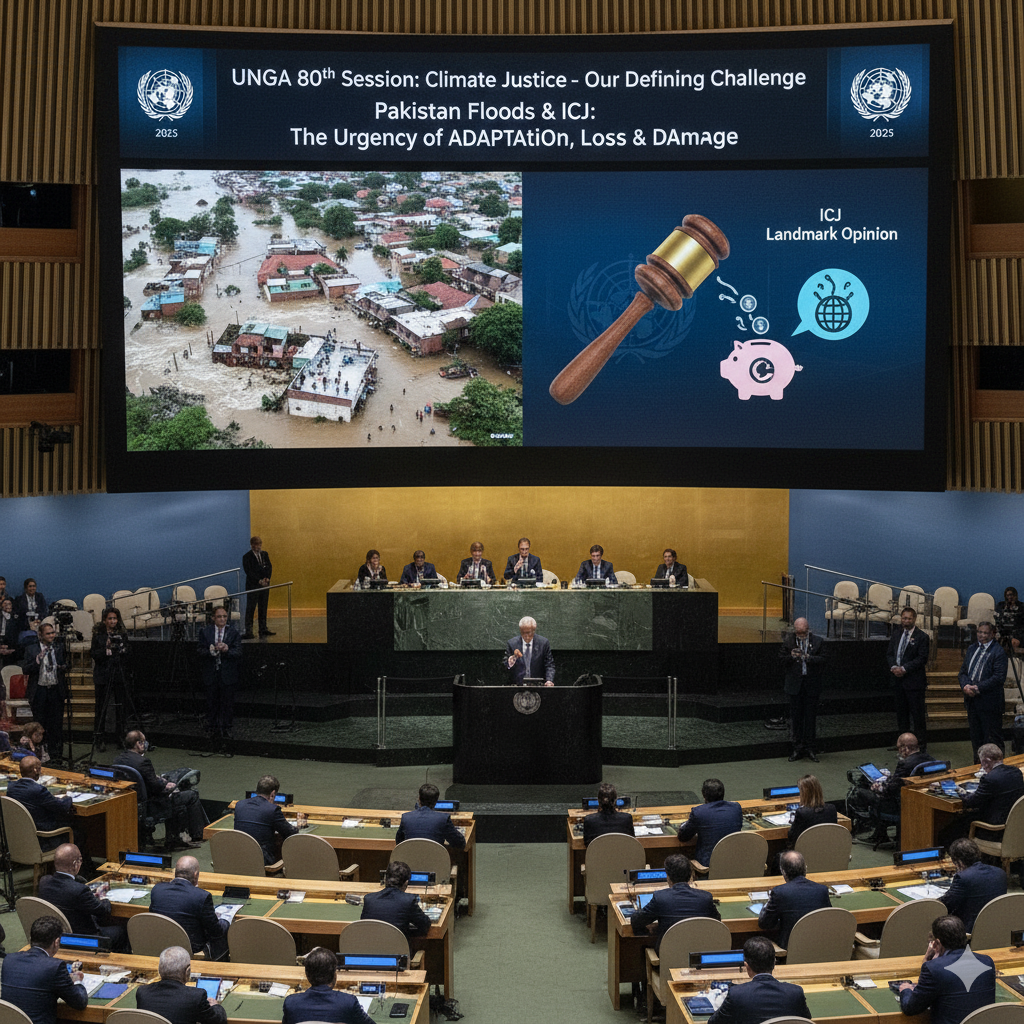Introduction: UNGA at a Crossroads
In 1945, the United Nations General Assembly (UNGA) was born from the ashes of World War II as a beacon of multilateralism and peace. Eight decades later, in 2025, it stands at another historic crossroads. This time, the threat is not war between nations, but the escalating climate emergency that transcends borders and strikes at the very survival of humanity.
As the UNGA celebrates its 80th session, it must decide whether it will remain a platform of symbolic speeches or transform into a force for climate justice. The moral, legal, and political weight of this moment cannot be overstated: for millions of vulnerable people worldwide, the credibility of the United Nations depends on its ability to rise to this challenge.
Climate Change as a Human Rights Crisis
For decades, climate change was framed as an environmental or economic issue. But the growing body of evidence and lived experiences from vulnerable nations reveal its deeper reality: climate change is a human rights crisis.
When rising seas swallow homes in Bangladesh, when drought drives hunger in the Horn of Africa, when floods submerge one-third of Pakistan, these are not just natural disasters. They represent violations of the rights to life, shelter, food, water, and dignity.
The International Court of Justice (ICJ) underscored this shift in July 2025 by issuing an advisory opinion stating that states have a legal obligation under international law to reduce greenhouse gas emissions and protect communities from climate harm. This opinion carries profound implications: it affirms that climate inaction is not just negligence but a breach of international human rights norms.
Pakistan’s Floods: A Case Study in Climate Injustice
Few examples capture the injustice of climate change as starkly as Pakistan’s recent history.
- In 2022, unprecedented floods displaced 33 million people, killed more than 1,700, and inflicted economic damages exceeding $30 billion.
- By mid-2025, monsoon and cloudburst-triggered floods killed more than 800 people, again uprooting communities and crippling infrastructure.
- Despite being home to nearly 250 million people, Pakistan contributes less than 1 percent of global greenhouse gas emissions.
These figures highlight a brutal paradox: those least responsible for climate change are paying the highest price. Pakistan’s plight is a warning to the world of the systemic inequities embedded in the global climate crisis.
The Global Funding Gap: Loss and Damage Still Undelivered
One of the most significant milestones in international climate negotiations was the creation of the Loss and Damage Fund at COP27 in 2022. The fund was meant to channel resources from wealthy, high-emitting countries to nations facing the worst climate impacts.
Yet, nearly three years later, the fund remains largely empty. Current pledges amount to just a few hundred million dollars, while actual needs run into the trillions. According to the United Nations Environment Programme (UNEP), adaptation finance requirements in developing countries could reach $300 billion annually by 2030. Today’s flows are only a fraction of that, leaving a gaping shortfall that translates into lost lives, destroyed livelihoods, and communities locked into cycles of poverty.
The UNGA at 80 must not settle for vague promises. It must demand binding commitments, transparent disbursements, and accountability from wealthy nations. Climate finance is not charity; it is compensation for historical harm caused by centuries of emissions.
Climate Change as a Threat Multiplier
The consequences of inadequate climate action extend beyond environmental damage. Climate change acts as a threat multiplier, worsening existing vulnerabilities and fueling instability:
- Food security: Droughts and erratic rainfall are projected to cut South Asia’s agricultural output by up to 20% by 2050.
- Migration: The World Bank estimates that by 2050, 216 million people could be displaced by climate-related events.
- Conflict: Resource scarcity linked to climate stress has already exacerbated tensions in regions like the Sahel and South Asia.
By framing climate change within the human rights and security paradigm, the UNGA has the chance to redefine its response as both a moral duty and a strategic necessity for global peace.
The Role of Global Governance: What Must Change
The United Nations has played a critical role in shaping international dialogue, but dialogue alone is no longer sufficient. To remain relevant, the UNGA must drive structural reforms and bold new initiatives.
- Establish a UN Climate Justice Council: A dedicated body to monitor states’ compliance with their human rights obligations under climate law, issue reports, and recommend sanctions or reparations.
- Enforce Climate Accountability: Develop legal pathways for victims of climate injustice to seek redress through international courts and arbitration.
- Scale Up Climate Finance: Move from billions to trillions in adaptation and loss-and-damage finance, with predictable mechanisms such as levies on fossil fuel profits or carbon border taxes.
- Amplify Voices from the Frontlines: Ensure that small island states, indigenous peoples, and vulnerable communities are not only represented but also central in decision-making.
A Call to Action: Justice Over Delay
The legacy of the UN is built on promises to “save succeeding generations from the scourge of war.” Today, the scourge is climate change, and the succeeding generations are already here, demanding justice.
The 80th UNGA must choose justice over delay, action over apathy, and responsibility over indifference. Lofty speeches will no longer suffice. What the world needs is binding commitments, robust institutions, and a shared moral compass that prioritizes people over politics.
Conclusion: A Defining Legacy for the UNGA at 80
As leaders gather in New York, they carry the weight of history on their shoulders. The UN at 80 is not just a milestone to celebrate but a test of relevance. Will it stand as a relic of the past, or will it rise to define the future?
Climate change is the defining challenge of our time, and climate justice is the measure by which global governance will be judged. The answer must be written not in declarations but in action — in trillions mobilized, emissions reduced, rights protected, and lives saved.
The UN was born to unite the world against existential threats. In 2025, its duty is clear: to stand for climate justice, to defend human dignity, and to ensure a liveable future for all.







